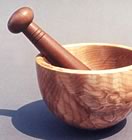|
HOMEOPATHY
 Widely practised in the U.K, India, Pakistan, U.S. and
other European and South American countries. Homeopathy is viewed
as a complete system
of medicine which promotes natural healing processes where remedies
are given to strengthen the body's own inherent healing capacity.
Its practitioners
realise that it is a methodology not only to treat the sick, but can
also help prevent illnesses and enhance general good health. It
is based on
sound principles, techniques and seeks to treat the patient as a whole,
not just the disease. The term Homeopathy stems from the Greek word ‘Homos’ meaning
like or similar and ‘Pathos’ which means suffering. Widely practised in the U.K, India, Pakistan, U.S. and
other European and South American countries. Homeopathy is viewed
as a complete system
of medicine which promotes natural healing processes where remedies
are given to strengthen the body's own inherent healing capacity.
Its practitioners
realise that it is a methodology not only to treat the sick, but can
also help prevent illnesses and enhance general good health. It
is based on
sound principles, techniques and seeks to treat the patient as a whole,
not just the disease. The term Homeopathy stems from the Greek word ‘Homos’ meaning
like or similar and ‘Pathos’ which means suffering.
Certain principles of Homeopathy date back to the Greek physician Hippocrates
in the 5th century BC. However, the discovery and development of this
unique system of natural medicine is attributed to the 18th century
German doctor, Samuel Hahneman. He defined and laid the foundations
of homeopathic
theory based on natural laws such as the ‘law of similars’ which
implies that like cures like.
For example, if suffering from insomnia conventional medical treatment
may include drugs that would induce a type of artificial sleep, this
can be defined as the way of opposites. The alternative Homeopathic
way of
similars would give the sufferer minute doses of substances such as
coffee, which under normal circumstances in large quantities would cause
sleeplessness.
Another good example is the patient who is suffering flu or hay fever
like symptoms, runny nose, itchy eyes etc. Here the homeopathic remedy
would once again suggest the administration of a minute dosage of a
substance, which in bigger doses causes similar symptoms in a healthy
individual.
In this case, that may mean homoeopathically prepared doses of onion.
The remedy provided will then stimulate the body’s own inner healing
ability.
Each remedy is discovered firstly through a standard homeopathic procedure
where a substance is tested on a group of healthy volunteers for its
effects and then the symptoms are recorded, analysed and compared to
produce results
that then define a particular remedy. Each homeopathic medicine has
its unique symptom recorded in the homeopathic Materia Medica (the study
or
science of drugs, their preparation, properties, uses and effects)
As mentioned earlier, homeopathy places greater emphasis on dealing
with an individuals illness on a complete level. In assessment terms
this means
analysing a persons mental, physical and emotional status. A patient
would be examined and asked to relay all details concerning symptoms,
feelings
and any related history. The assessment would also take into account
an individuals character, lifestyle, family medical history, diet, exercise,
stress levels etc. The homeopath would then be in a position to select
a single remedy which best reflects the patients symptoms and will stimulate
the body’s natural defence systems. The number of appointments,
remedies and amount of treatment will differ between patient, severity
and condition.
Most Homeopathic remedies are derived from plant, animal, and mineral
extracts. In there original form, some of these sources can be highly
poisonous, however the homeopathic method of preparation ensures safety
partly due to the extremely high dilution rates. The remedies are prescribed
in various forms, liquids, powders or sugar pills. Homeopathic medicines
can be applied as a main or supplementary form of treatment for most
illnesses and ailments for people of all ages. An established alternative
to conventional
medicine, this subtle form of natural therapy is safe, gentle, cheap
and effective.
|



![]()


